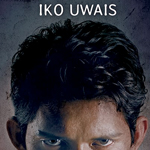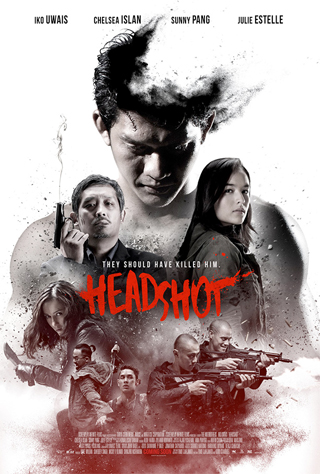 We all know Iko Uwais as the star of THE RAID [REDEMPTION] and THE RAID 2. Those movies showcase him as a likable hero and incredible martial artist, but they’re also a strong collaboration with co-star/co-choreographer Yayan Ruhian and director Gareth Evans. Having also loved their earlier film MERANTAU I want to see that team keep working together as long as possible. Uwais without the others – as is the case with the 2016 film HEADSHOT – is still exciting, so I was frustrated that I couldn’t find it in theaters or on-demand when it came out. But for some reason by the time it finally came to video I sort of took my time getting around to it.
We all know Iko Uwais as the star of THE RAID [REDEMPTION] and THE RAID 2. Those movies showcase him as a likable hero and incredible martial artist, but they’re also a strong collaboration with co-star/co-choreographer Yayan Ruhian and director Gareth Evans. Having also loved their earlier film MERANTAU I want to see that team keep working together as long as possible. Uwais without the others – as is the case with the 2016 film HEADSHOT – is still exciting, so I was frustrated that I couldn’t find it in theaters or on-demand when it came out. But for some reason by the time it finally came to video I sort of took my time getting around to it.
Big mistake! HEADSHOT is fantastic, a reminder to never underestimate Uwais as a performer or choreographer. The directors are Kimo Stamboel & Timo Tjahjanto, also known as the Mo Brothers. They’re known more for horror than for action, having done a segment of the anthology TAKUT: FACES OF FEAR (2008), a feature called MACABRE (2009), and (with Evans) a segment of V/H/S/2 (2013). I tried watching their serial killer movie KILLERS (2014) and it seemed very well made, but the opening was legitimately disturbing and I think I was going through something and I decided I didn’t need it in my life at that time and turned it off. That doesn’t happen to me often!
That blood-soaked background seems to bring an extra brutality to these Mo Brothers’ version of a martial arts movie. In the violent world of HEADSHOT, you don’t ever shoot anybody one or two or six or nine times. A typical gunfight here involves two parties with rifles unloading every bullet they have into the other side. Both opponents remain on their feet as long as they can as volley after volley after volley explodes chunky blood from their chest, sometimes comes out the back. They groan and choke and their bodies jiggle back and forth and we hear the spulch and the splurch and the gurgling of escaping blood and shifting human meat, and eventually they’ll probly stare wide-eyed, still fully conscious, as they collapse to their knees and then on their faces to finally, maybe, hopefully die.
 As if to underline the importance of such excess, our hero is a coma victim who is still alive because all they did was shoot him point blank in the head and drop him off a dock. I mean, why would they think that would kill him? What on earth were they thinking?!
As if to underline the importance of such excess, our hero is a coma victim who is still alive because all they did was shoot him point blank in the head and drop him off a dock. I mean, why would they think that would kill him? What on earth were they thinking?!
Uwais is in a coma in a small hospital on an island where he washed up on the beach one day. When he wakes up he doesn’t know who he is, and picks up the name Ishmael because his doctor Ailin (Chelsea Islan) has been reading Moby Dick.
Lee (Sunny Pang) is a dangerous mobster we’ve seen escape from prison who hears about Ishmael and sends some of his men after him. They know him and call him Abdi. He knows how to fight. Many people get killed. Ailin gets kidnapped. Ishmael wants her back.
There are alot of these amnesiac killer stories, and I’m okay with that. It’s a good premise, worth doing more than once. Abdi is one of many people Lee kidnapped as a child and raised to be in his gang. So he became a killer through childhood abuse and training. Reborn as Ishmael he’s able to temporarily delete all that history, all that conditioning, and revert to a pure human being. The implication, then, is that screwing over others is not human nature. Remove the nurture, keep the nature, and his instinct is to help Ailin, not to work for Lee.
Lee is a truly scary and despicable villain. He’s powerful and legendary, sort of a Keyser Soze figure. The police don’t even know who he is. He seems to see himself as a cool gangster, and a legitimate father figure to his gang. I think he really believes he loves them and has done well by them. But we know he’s a sicko.
The fights are long and harrowing and tell their own little stories. All of Ishmael’s major opponents have unique fighting styles and character quirks. As Ishmael battles his way through a series of enemies it becomes more and more clear that he was once close to them, that they feel betrayed by his departure, and that they would rather not kill each other, but still will have to. The action choreography is excellent and varied and full of cool gimmicks.
EXAMPLE 1: Ishmael is shackled to a desk for a police interrogation, and a guy comes in with a machete and kills his interrogator, so he has to fight the guy using the desk as a shield and weapon. When the guy stabs the knife all the way through the desk but misses him, Ishmael (COOL FIGHT MOVE SPOILER) flips the desk around to impale the attacker on his own weapon.
But then there’s an extra touch that you wouldn’t usually get: a long, quiet moment as the gasping, dying man pathetically reaches under the desk to pull the knife out. It could end on the awesome action move killing a bad guy, instead it takes time to non-judgmentally contemplate mortality.
EXAMPLE 2: A long fight below and on top of a row of tables, Ishmael’s attacker with a shot gun that the two wrestle over. The gun blows a hole through one of the desks, later is dropped and falls through the same hole. Also he lifts the guy and bashes his head into the drop ceiling. And he fires off the gun next to his head and burns half his face. It’s not just shooting and punching, it’s a long list of these little moments.
And it’s just as full of cool directorial choices.
EXAMPLE 1: In the foreground we see Ailin and a kidnapped girl crouched behind a desk, cowering, like the kids hiding from the raptors in JURASSIC PARK. And slightly out of focus we see the gunmen who are looking for them, and Ishmael coming from behind, kicking and shooting those guys and saving the day.
EXAMPLE 2: A gang member named Besi (Very Tri Yulisman) disappears behind a large tree, and Ishmael can’t find him. In the top of the frame there’s a weird looking branch that hangs down in such a way that we have to wonder for a second “Is that him? Did he climb up the tree?,” but it really it’s just a branch. Then as the camera roams around and creeps higher and higher up the tree and just before it cuts there is a frame or two where we do see Besi and yes, he did climb up the tree. Next the camera looks up at Ishmael and slowly rotates until it fully reveals Besi above and he drops down to attack.
I mean, any scene where a guy drops from above to attack is gonna be cool, but they go the extra mile in setting it up suspensefully.
And there are great moments that are about more than just violence. They’re about humanity and violence. When BIG ASS ENDING SPOILER Ishmael seems to have finally vanquished his so-called father, impaling him on a sharp branch, he sits with him and watches the rain cleanse his bloody skin. But Lee is still alive and grabs him and tries to pull him in, to impale him on the same piece of wood. Eventually Ailin comes from behind and pulls Ishmael away and this is his whole life right here – Lee trying to drag his “son” down with him, Ailin, the positive influence, pulling him away to where he’s safe, leaving that asshole to die alone like he so richly deserves.
Uwais and screenwriter/co-director Tahjanto are credited as action directors, and they have done A++ work here. It seems that some prominent reviewers found the movie too long, too brutal, ultimately exhausting, and I get that. You might have to be a connoisseur for this one. To me it’s completely captivating, a marathon, an endurance test not for me, but for Ishmael, much like that classic fight in THE RAID where Mad Dog keeps going so much longer than seems physically possible and the longer it stretches the more exhilarating it gets, like you’re running on adrenaline. This is a physical gauntlet but also an emotional one, and if he makes it through he’ll come out the other side as the normal nice person he might’ve grown into if his life had gone the right way and he’d never met that sorry bastard Lee.


























April 4th, 2018 at 10:28 am
Saw this on Netflix a while back, and I’m ready for a second viewing.